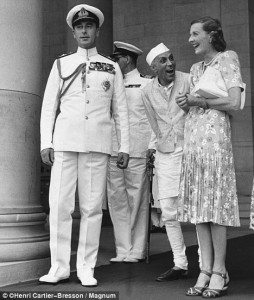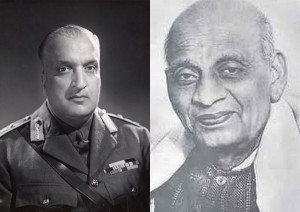Peace Watch » Editor's Take, Point of view » Mountbatten didn’t promise Kashmir to Sardar Patel
Mountbatten didn’t promise Kashmir to Sardar Patel
PUNCHLINE
Apple Outside Basket
By
Z.G. Muhammad
Z
 Lord Mountbatten, before sailing across Indian Ocean lock, stock and barrel did yeoman’s service to India- a great favor, which most towering Indian National Congress leaders could not have done. He had an option to leave India ‘with a fatal fragmentation into scores of states to be headed by ‘flocks of glided peacocks, the Maharajas and Nawabs.’ In theory, the British cabinet had also agreed that these rulers ‘who once surrendered their states to the King Emperor should now return to them. These rulers, having private armies and air force were potent enough to disturb the dream of the Congress leadership to inherit India that the British had cobbled together.
Lord Mountbatten, before sailing across Indian Ocean lock, stock and barrel did yeoman’s service to India- a great favor, which most towering Indian National Congress leaders could not have done. He had an option to leave India ‘with a fatal fragmentation into scores of states to be headed by ‘flocks of glided peacocks, the Maharajas and Nawabs.’ In theory, the British cabinet had also agreed that these rulers ‘who once surrendered their states to the King Emperor should now return to them. These rulers, having private armies and air force were potent enough to disturb the dream of the Congress leadership to inherit India that the British had cobbled together.
The majority of these Maharajas and princesses were friends of Lord Mountbatten and they ‘believed he was going to be their savior.’ Nevertheless, he wanted them to abandon any claim to independence and to proclaim their readiness to join India and Pakistan. In return, he had shown his willingness to plead with Jinnah and Nehru for ‘best arrangements for their futures.’ Mountbatten proposed the deal, to the excitement and thrill of Sardar Patel, next interior minister of the dominion of India. Patel told the Viceroy, ‘it’s has got to be everybody. If you can bring me a basket filled with every apple off the tree, I will buy it.’ “For a few minutes,” Larry Collin and Dominique Lapierre write, “the last Viceroy and India’s future Minister of States bargained like carpet merchants over these states.” Undoubtedly, Kashmir was not the apple in the basket that Mountbatten promised to Sardar Patel. “It was not, however, into Patel’s basket that Mountbatten proposed to drop the Kashmir apple,” ” write authors of ‘Freedom at Midnight,’ “Logic seemed to dictate that Kashmir wind up in Pakistan. Its people were Muslim. It had been one of the areas originally selected for an Islamic State by Rahmat Ali when had first formulated his possible dream….The Viceroy accepted that logic”. Even Patel had not shown any enthusiasm to see the Kashmir apple in his basket. He also had initially concurred Kashmir joining Pakistan. “Notably while Nehru always wanted Kashmir to be part of India,” writes contemporary Indian historian Ramachandra Guha, “Patel at one time inclined to allow the state to join Pakistan. His mind changed on 13 September, the day Pakistan accepted of Junagadh.” (India After Gandhi p 63). Many historians have contested this argument and opined that Nehru worked hard to make Patel change his views by playing various emotive cards.
The question, why Nehru wanted Jammu and Kashmir to be part of India was got wrong even by many distinguished historians including Alastair Lamb and Stanley Wolpert. It was not his love for his roots that blurred the historical realities of the British partition plan or situation on the ground in the state. It was not equally his passion for Kashmir to quote Stanley Wolpert that ‘affected his political and diplomatic judgment.’ That resulted in three wars directly connected to Kashmir and had brought the South-Asian region to the brink of a nuclear holocaust. It was not for great ideals of secularism and socialism’ that ostensibly seduced some top leaders of the state towards him that he wanted a state with eighty percent Muslim population to be part of India in contravention to the Indian Independence Act 1947. Nehru wanted Kashmir for two reasons one, for its strategic importance, two, using it as launching pad against Pakistan. In 1946, according to Colonel Webb ‘Nehru had developed a definite policy for the future of the State of Jammu and Kashmir once the British had departed. It was to be made into an anti-Pakistani zone to the North of Punjab with the help of National Conference.’ (Birth of A Tragedy p 48) It was Nehru’s, this game that was at play when in 1946, National Conference and its leadership raised the slogan “Bainama Amritsar Tudh Doo Kashmir Haamari Choohad Doo”, ‘Tear Amritsar Sale deed to shreds and quit Kashmir’. When Indian High Commissioner to Pakistan, Sri Prakasa in 1947 suggested to Mountbatten ‘for peace the best thing was to hand over Kashmir to Pakistan’. Nehru was annoyed with him and told him ‘Kashmir will swiftly bankrupt Pakistan.’ Moreover, it was his belief that with a bankrupt Pakistan Kashmir despite drawing strength from the UN resolution will automatically fall completely into India’s basket. But, it took him five years to realize that it was not going to happen. He candidly admitted it in a note to Sheikh Abdullah on 25 August 1952 from Sonamarg: “We are superior to Pakistan in the military and Industrial power. But, that superiority is not so great as to produce results quickly either in the war or by fear of war.” In the same letter, he showed readiness to “give in” the AJK to Pakistan.” In this letter written in a didactic tone to Abdullah despite Nehru asserting New Delhi’s stated position on Kashmir also manifests “fear of people wishing to part company” lurking in his mind. Nehru, a year after this letter to Sheikh Abdullah used all coercive tactics to kill the ‘wish of people’ that he feared most. The harsher historical reality is neither he nor his successors could achieve this objective. Instead of working for instilling confidence in the relationship that the State had entered into with India through “conditional instrument of accession” New Delhi’s by removing one after another prop of this relationship after 1952 has eroded it and strengthen the “wish” of the people that Nehru had mentioned in the above-quoted letter.
Today, when India and Pakistan are completing seventy years of Independence people of Jammu and Kashmir continue to be caught up in the cruel web of political uncertainty- that has been bringing them death and destruction at regular intervals. The fact of the matter is that Kashmir dispute is a historical reality and seventy years of post-independence have shown that it cannot be wished away through coercion, procrastination or denial but needs to be addressed.
Published in Greater Kashmir on 14-8-2017
Filed under: Editor's Take, Point of view







